Human Flower Project
Memory Fails Me Not
John Levett, venturing after poet Philip Larkin, recreates his own past —true to the present.
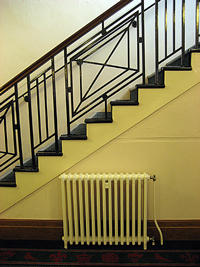 At Hull University
At Hull University
Essay and photos by John Levett
About a week ago I delivered a presentation entitled ‘Refractory memory.’ Some of the definitions of ‘refractory’ include obstinate, stubborn, mulish, pigheaded, obdurate, headstrong, self-willed, wayward, wilful, perverse, contrary, recalcitrant, obstreperous, disobedient, difficult. For this the research group, I was presenting work derived from a four day stay in the city of Hull on the Humber estuary; in the context of my own photographic practice, I was reflecting upon the persistence of pronounced subjects in the images that I capture. I was also asking why I keep returning to Hull. Screen dissolve.
In the first week of October 1964 I travelled up to Hull to the university. I stayed for three days. It was the first of five universities that I went to in the ‘60s. I could never settle to the life. It has only been of late that I have recognised the processes by which I learn and none of the places I went to in that decade let me get on with my own curriculum. With Hull, however, I never gave it a chance.
I went up on the Monday in a friend’s car and we arrived long after nightfall. I woke up in the morning in the hall of residence I’d been assigned, took a look around the barracks, found out it was miles from the campus and started making my exit plans. Day two included a talk by the librarian on what to expect. He stood above us (on a stage? on a podium? just tall?) and said: “I feel like Hitler or John Lennon.” It was at this point that I missed a trick. Anyone who comes out with a first line like that in the retentive context of the provincial university of that time is no bore. If he’d then read ‘This Be The Verse’ then I’d have taken notice, bought the book and hung around. He didn’t as he hadn’t written it yet, and he’d have found self-promotion vulgar anyway.
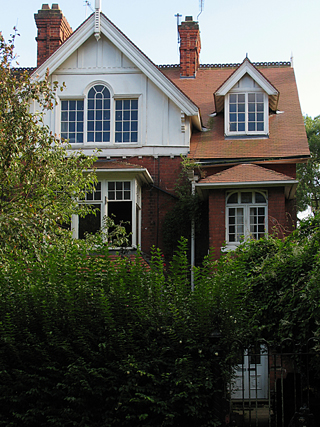 Pearson Park, Philip Larkin lived in the top flat during his early years at Hull
Pearson Park, Philip Larkin lived in the top flat during his early years at Hull
It wasn’t until later that year that I found out he was Philip Larkin, bought ‘The Whitsun Weddings’ and stayed with his poetry for life. Now here’s a footnote: in October 1964 not only did my mate and I go up to Hull but so too did my first girlfriend of some four years previously. After I left Hull my place was taken by another mate who later married said girlfriend. Some years later we met up again in Trafalgar Square where I lent her my copy of ‘The Whitsun Weddings.’ Now here’s another footnote: after leaving Hull I went to the London School of Economics, which I left after a term. In October 1965 I went up to Leicester University, where Larkin had been an assistant librarian from 1946 to 1950. Fade to black.
The cause of my setting off on the Larkin trail was a broadcast in December 1964, a programme in the BBC’s Monitor series called ‘Down Cemetery Road’ — Larkin & John Betjeman wandering around Hull and talking poetry. After that I bought everything Larkin. Then came Andrew Motion’s biography in 1993. This blew the lid on Larkin the pornography collector and other offences against the current dispensation. The later ‘Letters,’ many of them to Kingsley Amis, revealed further horrors and violations of the right true path. Recently, Martin Amis (Kingsley’s son), introducing a collection of Larkin’s verse, rightly asserted that all that matters is the work. I’m signed up to The Philip Larkin Society and have the full set of their fine journal.
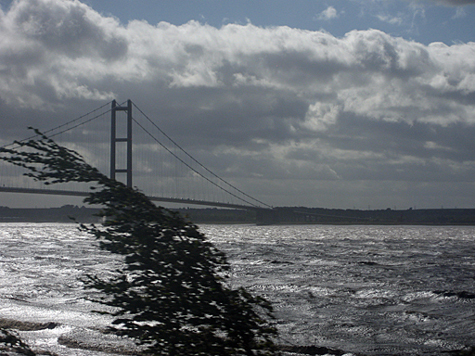
Humber Bridge
I started travelling back to Hull in 1983. I’d driven up to Potterton’s alpine nurseries in Lincolnshire and thought I’d drive over the Humber Bridge and remind myself of the university. And so it went—every few years I’d drive up to Potterton’s and pop into Hull; I’d be attending a conference in Nottingham and take a day off to visit or driving down from the Yorkshire moors and make the detour. I’d make connections with the Wolds and the writings of Winifred Holtby and off I’d go again. The trips ended when I gave up car ownership but this year I went back, by rail, swerving east but no longer ‘from rich industrial shadows.’
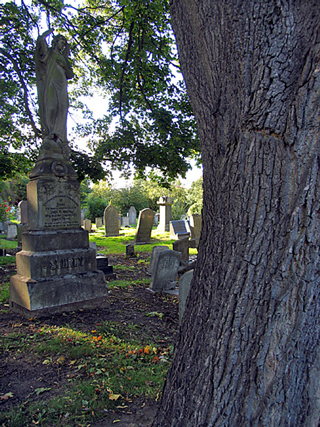 Spring Bank Cemetery, featured in the Monitor film of Larkin and John Betjeman
Spring Bank Cemetery, featured in the Monitor film of Larkin and John Betjeman
There’s a Larkin Trail now and a Larkin statue in Paragon Station close by the Royal Station Hotel, not far from the Large Cool Store, on the way to the (no longer) ‘barge-crowded water.’ There’s the cemetery—and over there Pearson Park, the infirmary and catch the bus here for Cottingham where Larkin was given a room in one of the halls of residence when he first came to Hull in 1955; he couldn’t stand living in one either and left for a series of lodgings.
I must have read an article somewhere about Larkin as a nature poet because the idea keeps coming back to me. Try these: At Grass, Here, First Sight, Afternoons, The Trees, Show Saturday, Cut Grass. Then there’s The Mower; Larkin’s poem to a hedgehog he killed whilst mowing long grass. Too sentimental or a felt-something? Here’s the ending: ‘…The first day after a death, the new absence/Is always the same; we should be careful/Of each other, we should be kind/While there is still time.’
It’s not just direct, identifiable nature in its living form; it’s the presence of that which isn’t urban, isn’t built, isn’t contrived, isn’t temporary but rather pervades a culture, roots, a permanent folk-memory and if that sounds too much like a reactionary, nationalist and völkisch imagining, then it’s possibly confirmed in ‘Going, Going’ (…First slum of Europe: a role/It won’t be so hard to win/With a cast of crooks and tarts.) and then refuted in ‘Show Saturday’ (…Back now, all of them, to their local lives …/To winter coming, as the dismantled Show/Itself dies back into the area of work./ Let it stay hidden there like strength, below/Sale-bills and swindling; something people do/Not noticing how time’s rolling smithy-smoke/Shadows much greater gestures; something they share/That breaks ancestrally each year into/Regenerate union. Let it always be there.) But then it won’t: ‘All that is solid melts into air, all that is holy is profaned.’ (K.Marx)
I was once interviewed by a Cambridge post-graduate researching Larkin and asking me if I thought that Larkin’s audience was of a certain age. I could see what he was getting at—those born in the late 1930s and in the 40s; those for whom modernity held a difficult-to-put-into-words threat; those whose certainties were being gradually erased; those who felt the loss of something that hadn’t quite happened; those looking back and half waving.
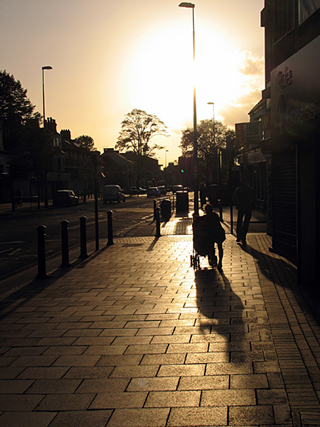 Anlaby Road, Hull
Anlaby Road, Hull
Which returns me to Refractory Memory. I came back from Hull with over eight hundred images but without looking through them I knew what it would be that would dominate the collection—the sunlight on red brick, the once ‘rich industrial shadows,’ the garden village, the gathering and gathered de-industrialisation, the paramountcy of the built fabric, the remnants of earlier class indicators, the edge of England, the New Artisanal boutiquery, the memorial, the brick and the tile and the ironwork—and so it was.
Whilst I was sorting the work the thought of Terence Davies films came to me. I recently read a review of ‘Time and the City’ which asked how one could be nostalgic for a time that was awful? Davies hated his life of growing up—a violent, unpredictable father, feeling ugly, knowing he was gay at a time when it was best to pretend otherwise, failure to find any permanent experience of love but … The snatches of film of those growing-up years hold within them the acknowledgment of loss; of time moving on without having been grasped and the reluctance to concede it never can be.
Going back to Hull, Larkin’s poetry, the content of the portfolio, the first girlfriend, the leaving of home are all part of a piece; a recreating of an archive that is many decades gone. The ephemera that collects around a life I have long ago lost or destroyed; some wilfully, some carelessly, most regrettably. I walk these towns and cities performing an act of recreation. Larkin did the same but then I think that’s true of poetry—trying to hold the moment and hold it long enough to make it true again. And again.
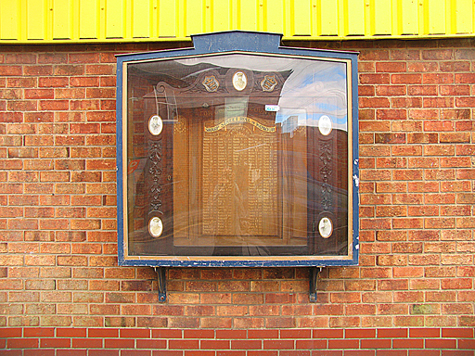
War Memorial, Sharp Street
As I came back down England I, inevitably, read ‘The Whitsun Weddings.’ I held myself at the line: ‘…and none/Thought of the others they would never meet/Or how their lives would all contain this hour’ and rather than ‘a sense of falling’ I felt uplifted. I remembered the two friends I had left in Hull in October 1964 and how it was my loss and, in so thinking, I thought of those that I now knew and got swept up with the joy of how lives unfold. The loss of elements of a life, of a culture is of the moment; the gathering of companionship is permanent. We put up a new show last weekend. People dropped in to give an hour or two; some stayed all day; curatorial decisions that could change the world got debated; communality, long supposed to be dying or dead, breathed healthily. I knew that I was glad I knew these people. My refractory remembrances of an imagined Hull cascaded down a wall. Past and present all present and correct.

